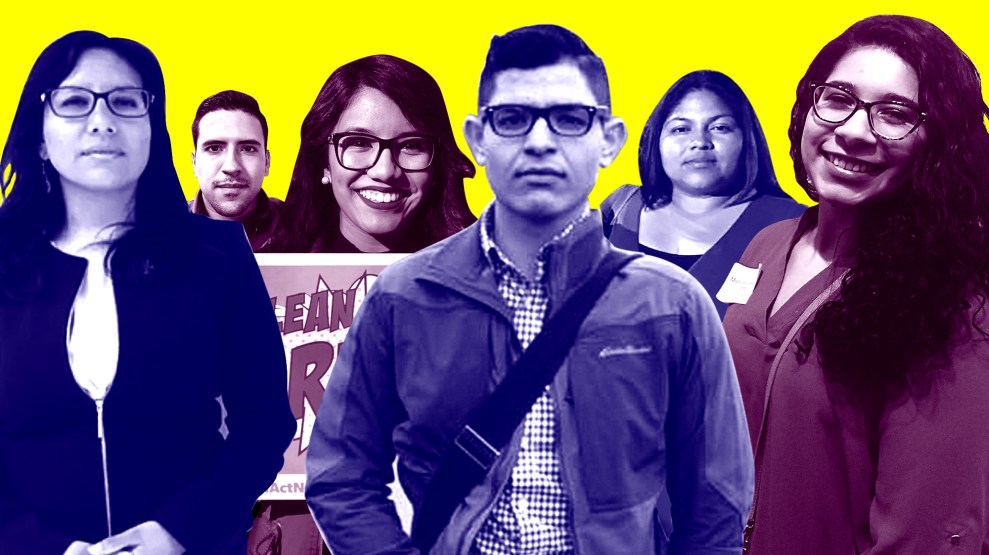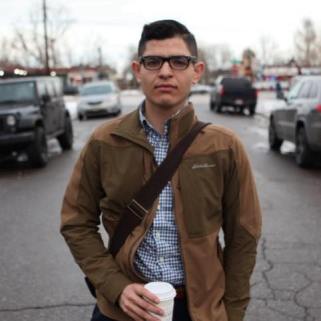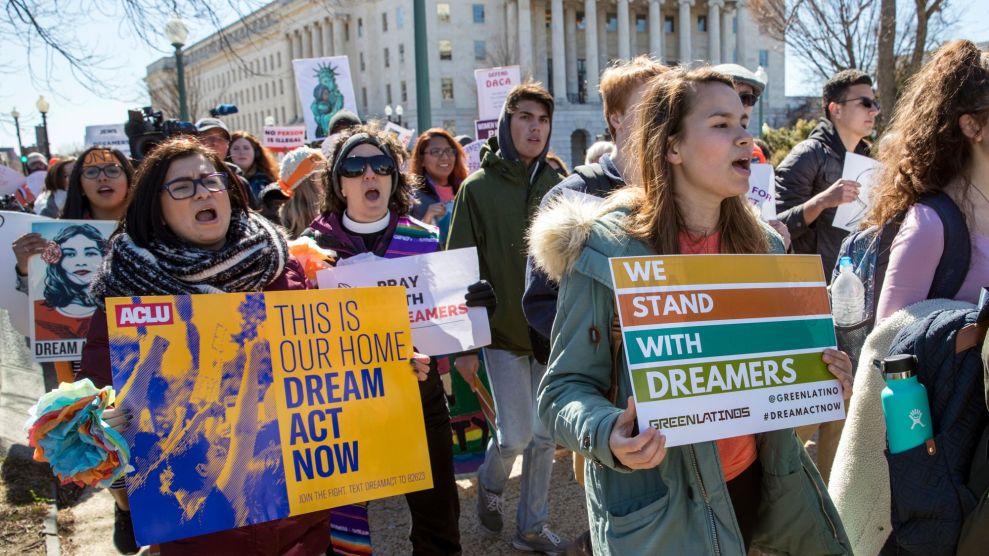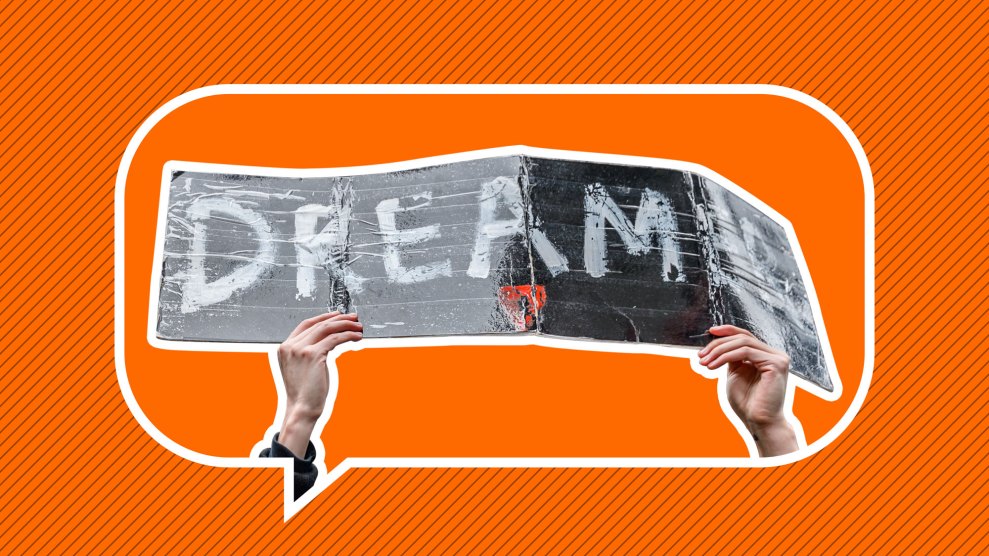
Mother Jones illustration; Courtesy photos
Last September, the Trump administration announced it would rescind the protections granted by DACA, or Deferred Action for Childhood Arrivals—an Obama-era program that shielded from deportation undocumented immigrants who came to the United States as children. Though the action was quickly challenged by several federal lawsuits, there has been no clear resolution, leaving more than 700,000 DACA recipients and their families in limbo.
While several judges blocked the Trump administration’s move and DACA recipients can currently apply to renew their status, the program’s legal future might be tied up by another case in Texas. Seven state attorneys general sued the federal government to end the program earlier this year, and in September, the judge in Texas, Andrew Hanen, allowed DACA to continue for the time being but noted he believed the program was likely illegal. If Hanen eventually rules against the program, the conflicting decision could send the cases up to the US Supreme Court. If this happens, and nominee Brett Kavanaugh is confirmed, it’s likely he would cast the deciding vote on the program.
Earlier this year, we asked DACA recipients to share their stories with us—about what it’s like to go to school without knowing if you’ll be able to legally work after graduation, about finding out you’re undocumented for the first time, and about why it’s important to keep moving forward. To mark this year of uncertainty at the hands of President Donald Trump, we want to share what these young men and women have to say, in their own words. Responses have been lightly edited for length and clarity.
“I feel like I have to put all my plans on hold”
Since I was about 14, I wanted to join the Air Force. It was one of the most heartbreaking moments ever when I realized I wouldn’t be able to fulfill that dream, or attend college full time. DACA gave me a bit of hope and peace of mind. Even though I knew the program didn’t offer a permanent solution, it still made my life easier to be able to get a driver’s license and work legally. Unfortunately, my immigration situation is complicated, so DACA is all I have.
Trump’s decision to end DACA has been so stressful and frustrating, not only due to the fact the program was ended, but also due to Congress being incapable of passing permanent legislation. This doesn’t just affect my job and my future; it affects my well-being. I’m constantly worried about what will happen, unable to focus and unable to sleep at night. I feel like I will have to put all my plans on hold if there is no solution soon.
This is a big deal to me not only because my safety depends on me staying here, but because there is so much I want to do to help my community and others. It’s very hard to do this when my life here is threatened by this decision and by Congress’ inability to put politics aside and find a bipartisan solution. —Michelle Valladarez, who came to the United States from Honduras at age 9. She’s now 25 and living in Nashville, North Carolina.
“Is this all worth it?”
Due to the end of the program, my future has become incredibly uncertain. Every time I leave the house I become very uneasy because of the fact that any wrong move could be my end here. I find myself driving more carefully, being less confrontational, and attending fewer social events just to avoid problems.
I was grinding, working, and going to school before Donald Trump decided to end the program, and that can’t stop just because of this. Life doesn’t stop with the program. I still have to go to work and attend class. It has also affected my performance in school. The added stress of this situation makes it harder to focus on my homework and studying. My anxiety gets a hold of me and I start thinking, “Is this all worth it if I’m just going to get deported? All this hard work just to be thrown away in a flash?” I get through it, though, one day at a time.—Luis Aristizabal, who came to the United States from Colombia at age 6. He’s now 24 and living in Kissimmee, Florida.
Hear these Dreamers’ stories in their own voices on the Mother Jones Podcast—the segment starts around the 24:00 mark on the player below.
Living with an “expiration date”

Marco Dorado
The decision by the Trump administration to rescind DACA has thrown my life into chaos. For the most part I’m able to maintain my composure, but living with an expiration date above my head has been exhausting and anxiety-inducing, given that I’m unable to plan my life beyond the date my current DACA expires. I have to question if I’ll be able to renew the lease for my apartment this summer, if I’ll even have the ability to attend graduate school if accepted, if I’ll be able to make my car loan payments, and what I’ll do if I’m unable to legally work. On top of that, I have to worry about what the federal government will do with all the information DACA applicants and recipients have provided in terms of where we live, where we work, et cetera.
When DACA was first announced, I found opportunity every which way I turned—the opportunity to finally pursue the American Dream my family was in search of when we came here 23 years ago. I could finally put my college degree to use and support myself, my family, and my community. But this expiration date looming over you…that’s not the American Dream my parents sought.—Marco Dorado, who came to the United States from Mexico at age 3. He’s now 26 and living in Seattle, Washington.
“I had been mentally preparing myself for the end since the beginning”
When the announcement to end DACA was made, I was not surprised. What did surprise me was how long it had lasted in the first place, especially with the new administration. In high school, when I first considered applying for DACA, the first question that came to mind was, “When is it going to end?” I had been mentally preparing myself for the end since the beginning.
On September 5, I didn’t cry. I didn’t watch Mr. [Jeff] Sessions give his speech. I just watched my phone be flooded with news alerts and messages [that were] something along the lines of, “DACA program rescinded” and “Heyra, I’m so sorry…” My blood boiled. The worry that had been lingering in the back of my mind for five years was alive and very present.
I have been doing immigration activism work for about eight years now. As an activist and organizer, I, along with my community, have been taking this opportunity of DACA being in the spotlight to raise more awareness of the struggles and stories of undocumented immigrants. We are working harder, demanding more, organizing more, and inspiring more youth to come forward and join us in the movement. People are listening. People are watching. We are doing.
We are using this opportunity to fight for something bigger than ourselves. Not only do Dreamers matter, but so do our parents and family members. Not only are we advocating for a clean Dream Act, but also for protection for our families, for comprehensive immigration reform. The “good immigrant versus bad immigrant” debate that decides who is allowed to stay or go has to end. We are all humans worthy of respect and dignity.
It’s not always easy, though. There are days when I don’t feel strong enough to hold a microphone, days where I ask myself if my story is even worth telling, and days when my depression, fears, and anxiety try to win me over. But when I look at my community, I see resilience, I see hope, and I see fearless strength. When I look at my little brother, I know I have to keep fighting. I cannot give up. My family’s future depends on it. My parents risked everything to come to this country for a better life. I am fighting to protect it.—Heyra Avila, who came to the United States from Mexico at age 4. She’s now 22 and living in Florence, Kentucky.
“We can’t go back to the shadows”
I thought all our struggles were just because we were poor. I didn’t realize it was incidental to being undocumented. I was planning on taking the exam to get a driver’s permit—I had my first conversation with my dad, but I didn’t really understand…I thought it was just my dad not wanting to or not having money to buy the car. Then one day, I had received several acceptance letters from different universities. I walked into my counselor’s office and he said, “You’re an illegal immigrant. You’re not even going to go to community college. Forget the universities.” And it just…crushed me.
I went to talk to my mom, and she tells me, “Yeah, you’re undocumented.” But I think it’s also my mom’s stubborn side that made me say, “Don’t listen to them. You’re gonna do it, you can find a way, you’re going to do it.”
I received DACA—but more than anything it meant I can breathe easier knowing I didn’t have to look out for every person in uniform. I think DACA gave me a voice more than anything. And we can’t go back to the shadows. We’ve stepped out of the shadows. We’ve announced we are undocumented and there’s no going back from that.—Dulce Garcia, who came to the United States from Mexico at age 4. She’s now 35 and living in San Diego, California.
“They’ll never be able to take that away from you”
I applied for [DACA] in 2013. I’m about one year away from graduating, and hopefully entering the credentials program to become a K-8 multiple subject teacher. Unfortunately, without DACA or a work permit, I will not be able to go into the career I have been working on since 2010. It’s incredibly discouraging to watch and talk to the rest of my classmates about where they plan on teaching and their futures. I am forced to just sit there and listen because I don’t know what my future is.
I have two younger siblings that are also in college and also have DACA. In my mind, if I break down, then what kind of model, what kind of example is that going to set for them?
I think about my family. My dad was always the type to urge us to learn, to just do something with our lives. And he would even say: “Even if they won’t give you your papers, you’ll still have your education. They’ll never be able to take that away from you.”
If the program is terminated, I’ll still keep going to school. I’ll still find another way. Even though I was born in Mexico, my life is here. There’s still hope. There’s millions of us. This is our home. We grew up here. We’re part of these communities. We’re not going to leave. We’re here to stay because this is our country, too.—Maria Ramirez, who came to the United States from Mexico at age 8. She’s now 26 and living in Bakersfield, California.
Editor’s note: The ages in the videos correspond to the age when each person was interviewed.










